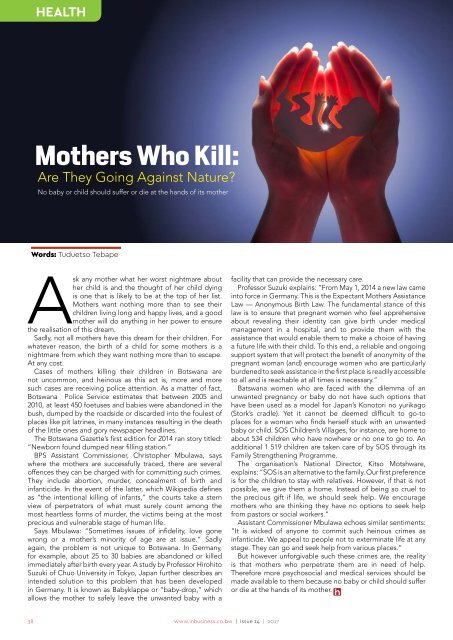inBUSINESS Issue 14
Create successful ePaper yourself
Turn your PDF publications into a flip-book with our unique Google optimized e-Paper software.
HEALTH<br />
Mothers Who Kill:<br />
Are They Going Against Nature?<br />
No baby or child should suffer or die at the hands of its mother<br />
Words: Tuduetso Tebape<br />
Ask any mother what her worst nightmare about<br />
her child is and the thought of her child dying<br />
is one that is likely to be at the top of her list.<br />
Mothers want nothing more than to see their<br />
children living long and happy lives, and a good<br />
mother will do anything in her power to ensure<br />
the realisation of this dream.<br />
Sadly, not all mothers have this dream for their children. For<br />
whatever reason, the birth of a child for some mothers is a<br />
nightmare from which they want nothing more than to escape.<br />
At any cost.<br />
Cases of mothers killing their children in Botswana are<br />
not uncommon, and heinous as this act is, more and more<br />
such cases are receiving police attention. As a matter of fact,<br />
Botswana Police Service estimates that between 2005 and<br />
2010, at least 450 foetuses and babies were abandoned in the<br />
bush, dumped by the roadside or discarded into the foulest of<br />
places like pit latrines, in many instances resulting in the death<br />
of the little ones and gory newspaper headlines.<br />
The Botswana Gazette’s first edition for 20<strong>14</strong> ran story titled:<br />
“Newborn found dumped near filling station.”<br />
BPS Assistant Commissioner, Christopher Mbulawa, says<br />
where the mothers are successfully traced, there are several<br />
offences they can be charged with for committing such crimes.<br />
They include abortion, murder, concealment of birth and<br />
infanticide. In the event of the latter, which Wikipedia defines<br />
as “the intentional killing of infants,” the courts take a stern<br />
view of perpetrators of what must surely count among the<br />
most heartless forms of murder, the victims being at the most<br />
precious and vulnerable stage of human life.<br />
Says Mbulawa: “Sometimes issues of infidelity, love gone<br />
wrong or a mother’s minority of age are at issue.” Sadly<br />
again, the problem is not unique to Botswana. In Germany,<br />
for example, about 25 to 30 babies are abandoned or killed<br />
immediately after birth every year. A study by Professor Hirohito<br />
Suzuki of Chuo University in Tokyo, Japan further describes an<br />
intended solution to this problem that has been developed<br />
in Germany. It is known as Babyklappe or “baby-drop,” which<br />
allows the mother to safely leave the unwanted baby with a<br />
facility that can provide the necessary care.<br />
Professor Suzuki explains: “From May 1, 20<strong>14</strong> a new law came<br />
into force in Germany. This is the Expectant Mothers Assistance<br />
Law — Anonymous Birth Law. The fundamental stance of this<br />
law is to ensure that pregnant women who feel apprehensive<br />
about revealing their identity can give birth under medical<br />
management in a hospital, and to provide them with the<br />
assistance that would enable them to make a choice of having<br />
a future life with their child. To this end, a reliable and ongoing<br />
support system that will protect the benefit of anonymity of the<br />
pregnant woman (and) encourage women who are particularly<br />
burdened to seek assistance in the first place is readily accessible<br />
to all and is reachable at all times is necessary.”<br />
Batswana women who are faced with the dilemma of an<br />
unwanted pregnancy or baby do not have such options that<br />
have been used as a model for Japan’s Konotori no yurikago<br />
(Stork’s cradle). Yet it cannot be deemed difficult to go-to<br />
places for a woman who finds herself stuck with an unwanted<br />
baby or child. SOS Children’s Villages, for instance, are home to<br />
about 534 children who have nowhere or no one to go to. An<br />
additional 1 519 children are taken care of by SOS through its<br />
Family Strengthening Programme.<br />
The organisation’s National Director, Kitso Motshware,<br />
explains: “SOS is an alternative to the family. Our first preference<br />
is for the children to stay with relatives. However, if that is not<br />
possible, we give them a home. Instead of being so cruel to<br />
the precious gift if life, we should seek help. We encourage<br />
mothers who are thinking they have no options to seek help<br />
from pastors or social workers.”<br />
Assistant Commissioner Mbulawa echoes similar sentiments:<br />
“It is wicked of anyone to commit such heinous crimes as<br />
infanticide. We appeal to people not to exterminate life at any<br />
stage. They can go and seek help from various places.”<br />
But however unforgivable such these crimes are, the reality<br />
is that mothers who perpetrate them are in need of help.<br />
Therefore more psychosocial and medical services should be<br />
made available to them because no baby or child should suffer<br />
or die at the hands of its mother.<br />
38<br />
www.inbusiness.co.bw | <strong>Issue</strong> <strong>14</strong> | 2017
















